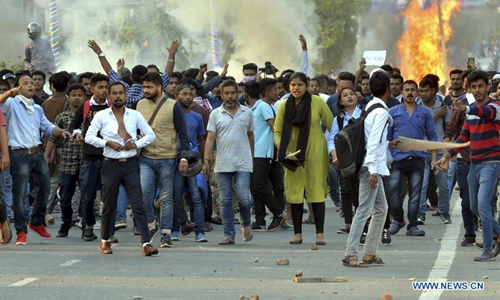With Hindu extremism growing unchecked, India is on the edge of a precipice: media

Protesters demonstrate against the Citizenship Amendment Act in Guwahati, India, Dec. 11, 2019. Photo: Xinhua
Hindu extremists are increasingly taking their "militant message" into the mainstream while fermenting "communal hate" in a push to convert India into a Hindu state, wrote the New York Times earlier last month in an in-depth article headlined As Officials Look Away, Hate Speech in India Nears Dangerous Levels.
The article pinpointed the rampant hate speech adopted by Hindu extremists against the Muslim community, including promoting a genocidal campaign to slaughter "2 million Muslims" and even pushing rhetoric in support of ethnic cleansing targeting Rohingya Muslims in Myanmar. Such hate speech "is stoking communal tensions in a country where small triggers have incited mass-death tragedies," the article wrote.
The prevalence of Islamophobic sentiments and rising incidences of violent attacks targeting Muslims have not garnered enough attention from the Indian government at both the central and local levels. On the contrary, Hindu extremists' heinous agenda is being "enabled" and even "normalized" by political leaders and law enforcement officials in the world's second-most populous nation, the article highlighted.
In consequence, Muslims and even other religious minorities in the country have had to contend with the mounting perils of hate speech and violent attacks.
Emboldened by the re-election of Yogi Adityanath (a monk who in the past formed a youth group accused of inciting violence), who serves as the Chief Minister of Uttar Pradesh, India's largest state, Hindu mobs in 2020 staged a series of riots in New Delhi that resulted in the grisly deaths of 53 people (many of whom were burned to death), and over two-thirds of which were Muslims.
In 2021, several video clips of violent attacks by Hindus went viral in India on social media: one showed a 45-year-old rickshaw driver being paraded through the streets of Kanpur, a city in Uttar Pradesh, as his teary daughter begged the mob to stop beating him, as reported by the BBC. In January this year, an Indian pastor and his wife were assaulted and wounded by a mob of Hindu extremists, and when they attempted to file a police report they were rejected by the local police.
India's political figures have not only turned a blind eye to Hindu extremists, but they instead have fostered a symbiotic relationship with them, since the group remains the staunchest supporter of India's right-wing politicians. On March 1, Bloomberg published an analysis entitled Anti-Muslim Hatred Is Shaping India's Elections, which pointed out that Indian political leaders have been exploiting "existing divisions in society" and "deep-rooted religious hatred" to cement their positions. "While India is sensitive to international criticism of its treatment of Muslims, it does little to address the problem," the analysis noted.
In January, Gregory Stanton, director of Genocide Watch, who previously predicted the massacre of the Tutsi in Rwanda before events broke out in 1994, said at a briefing that there were early "signs and processes" of genocide in India, according to Al Jazeera. Stanton was convinced that the Hindu extremists and their genocidal agenda must be stopped. "Because once the mobs take over it could turn deadly," he said.




































